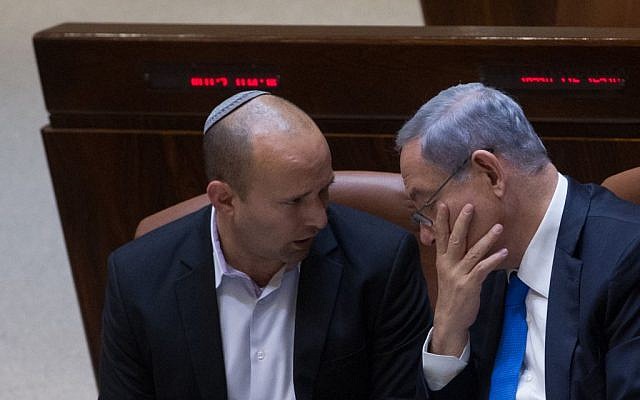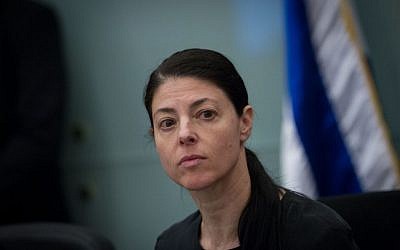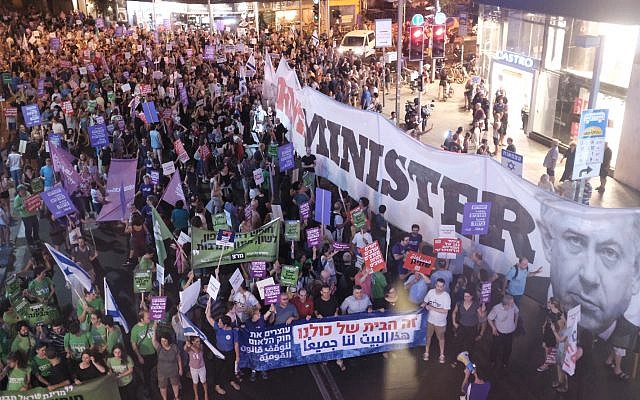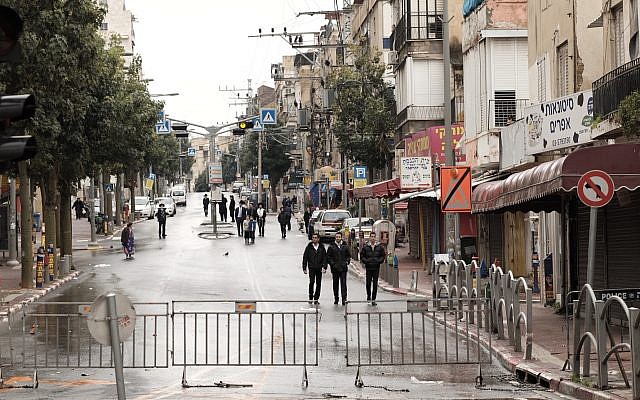Sanctioning of Jewish-only communities struck out in favor of more generic clause that urges ‘the development of Jewish settlement’ as ‘a national value’

Prime Minister Benjamin Netanyahu and Education Minister Naftali Bennett have reached an agreement on a key change to the nation-state bill that would remove a controversial clause sanctioning housing discrimination on the basis of ethnicity or religion, and replace it with a new one celebrating “Jewish settlement” in general terms.
Clause 7B of the Likud-sponsored legislation, which the government hopes to have approved by the end of the month, previously would have allowed the state to “authorize a community composed of people having the same faith and nationality to maintain the exclusive character of that community.”
Prime Minister Benjamin Netanyahu and Education Minister Naftali Bennett have reached an agreement on a key change to the nation-state bill that would remove a controversial clause sanctioning housing discrimination on the basis of ethnicity or religion, and replace it with a new one celebrating “Jewish settlement” in general terms.
Clause 7B of the Likud-sponsored legislation, which the government hopes to have approved by the end of the month, previously would have allowed the state to “authorize a community composed of people having the same faith and nationality to maintain the exclusive character of that community.”
In a bid to gain wider support for the bill and quiet its vociferous critics, Bennett had proposed language removing the clause and replace it with a call for strengthening the Jewish presence in predominantly Arab Israeli areas.
Following negotiations with the prime minister, Bennett said in a statement Sunday, the new version of the clause reads: “The state views the development of Jewish settlement as a national value and will act to encourage and promote its establishment and consolidation.”
Bennett said that the new version will face a Knesset committee vote on Monday before final plenary votes on the law ahead of the parliament’s summer recess on July 22.
Votes on other amendments to the bill were postponed Sunday due to the ongoing negotiations between coalition partners. It was unclear whether further changes were being considered.

Speaking on Israel Radio on Sunday morning, Bennett said that the bill was an important piece of legislation that should not be delayed, despite tensions on Israel’s southern border with the Gaza Strip and northern border with Syria.
Opposition members have come out in force against the bill, and on Saturday called for a delay in the discussions in light of the current round of violence in the south.
“The south is burning, dozens of sirens sounded last night and today, and the situation may further escalate. I call on the coalition and the committee to cancel the meeting that was intended for the vote on the national law, and to unite to protect the south,” MK Merav Michaeli of the Zionist Union faction tweeted.
“It is an illegitimate and dangerous law that is impossible to pass quickly while the artillery thunders.”
Meretz leader Tamar Zandberg tweeted that “when the government has no solution in Gaza, it enacts racist laws.”
Thousands of protesters marched through Tel Aviv Saturday night demonstrating against the bill. The demonstration, which was organized by a broad alliance of opposition parties, progressive Jewish groups, LGBT activists and left-wing NGOs, numbered some 2,500 people, and called on the government to scrap not only the clause on separate communities but the entire proposal.

Last Tuesday, opposition to the law as it stood was sounded by President Reuven Rivlin, who said the bill could allow the establishment of towns that would, for example, exclude Jews of Middle Eastern origin, ultra-Orthodox Jews or homosexuals; Knesset legal adviser Eyal Yinon; and Attorney General Avichai Mandelblit; and his deputy, Raz Nizri.

If passed, the law would become one of the so-called Basic Laws, which like a constitution underpin Israel’s legal system and are more difficult to repeal than regular laws.
Judaism is already mentioned throughout the country’s laws, and religious authorities control many aspects of life, including marriage. But the 11 existing Basic Laws deal mostly with state institutions like the Knesset, the courts and the presidency, while Basic Law: Human Dignity and Liberty defines Israel’s democratic character.
Netanyahu has announced his intention to push the bill forward to become law before the current Knesset session ends on July 22.
In addition, the law would also set Hebrew as the official language of Israel. Arabic would be relegated from an official language to one with “special status,” which would ensure its speakers the “right to accessible state services.”
The law would also declare that Jerusalem is the capital of Israel, make explicit the connection between Diaspora Jewry and the state and fix the Hebrew calendar as the official calendar of the state, as well as recognizing Independence Day, days of remembrance and Jewish holidays.
As reported by The Times of Israel
